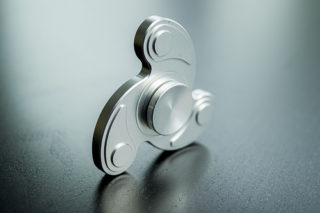
Q: If a kid has a fidget toy, what doesn’t he have?A: Enough to do with his hands.Photo by: fidgetcircle
A good example of good content is geometry. Why would any normal person ever need geometry? In order to have learned how to think. You bend your brain around one inference problem after another, and at the end of the year you are a lot harder to fool.
The Cautious love juggling abstractions and the Driven may admire the mechanical perfection of Euclidean logic. The Incandescent are shining it on and the Sociables are muddling through. But everyone thinks they’re studying math when in fact they are mastering logic. That’s why every American child born before 1970 or so had geometry in high school.
Another good example? Penmanship.
What!? Who needs that?
By now penmanship, particularly cursive hand-writing, seems comically obsolete. (Full disclosure: I write a lot, but I type more than I dictate and dictate more than I inscribe – and my scribbling is a challenge to everyone, sometimes even me.) But those fussy old schoolmarms weren’t teaching hand-writing – or that only as a side-issue, as with geometry.
What were they teaching? Diligence. Artistry. Persistence. Mastery. Not writing and not even just muscle control – they were teaching muscle control in pursuit of all human values. Without knowing that that was what they were doing, they were teaching DISC, all as a way of delivering a well-rounded education.
And what does well-rounded mean? What are we schooling kids for?
There are some postulated neurological benefits to mastering penmanship, and there are efficiency-benefits generally to analog versus digital notation and display systems. But mastering a good hand as a child matters even if, like me, you rarely make use of that skill later on in life.
Here’s another benefit of penmanship (or of life drawing, to pick a useful and plausibly-equivalent alternative) that has been impressed upon me lately: All children need to burn off excess energy, and Driven kids, especially, need something to do with their hands. A big chunk of the old-school schoolmarm’s day was devoted to providing kids who cannot not move the opportunity to move toward their own better natures – and, accordingly, better destinies.
All kids need to move. Driven kids need to move all the time. From game controllers to fidget toys to the pebbles down by the creek bed, kids need something to do with their hands. Cautious/Incandescent educationism forbids this, of course. It’s chaotic and disruptive. Instead, it is sufficient to drug the Driven, to charm the Cautious with ever-more-elaborate abstractions, to bribe the Incandescent with an ultimately-meaningless social status and to simply intimidate and/or bore the Sociables into a shamed and sheepish compliance.
Say what you want about the schoolmarms of old, your grandfather could read Shakespeare and your grandkids can’t read.
Can’t read.
If a kid fidgets, he needs a guitar or a piano – or perhaps just a good pen. A very simple purpose of education is to take the stuff that’s going to happen anyway and turn it to more-human ends. To fidget is useless, but to fidget on a ukulele, for example, is to make art that makes you better, makes the world around you better – and may well lead to relationships that could change your life forever. How PEAK is that?
Why did traditional education want for you to learn “useless” subjects like penmanship and geometry?
So you would be able, eventually, to figure out which side of the bread has the butter on it.
In that light, what do you suppose is the objective of the modern way of schooling our young?
Of greater importance – to me, at least – is how the ThriversEd curriculum proposes to deliver the goods. And that’s even simpler – more atomic – than the schoolmarm’s subtle sleights of hand:
We’re going to teach Performance, Accountability and Leadership – over and over again, every way we can think of expressing those ideas – all in pursuit of an ever-more-humane humanity.
Big things are made of little things. Old-school education snuck in the little things (good habits and solid virtues) by disguising them as big things (academic disciplines).
I’m not deliberately playing the opposite game, but I end up opposite to a lot of received ideas in pedagogy. So while I don’t care for top-down, outside-in education, I love bottom-up and inside-out. That’s how I learn, and that’s how you learned anything you really know – how do we say it? – inside and out.
Performance, Accountability and Leadership are the fundamental building blocks of a durable, robust, lifelong Driven/Sociable education. Once we’ve taught those, our kids will be ready to get busy teaching us.
How do you cultivate 100 perfect flowers from 100 planted seeds? All of them perfect, not 2 cruelly twisted and the other 98 slowly perishing – languishing for decades as the consequence of a deliberate, planned, hugely-expensive systemic neglect?
My answer?
Get out of their light.
Write that down 100 times, in a bold, clear hand, if it will help you to remember.















